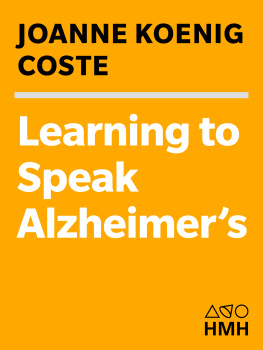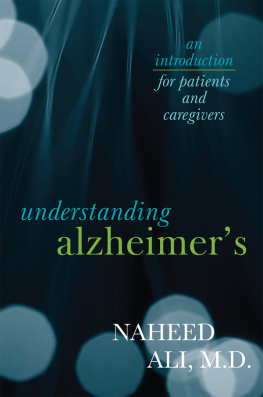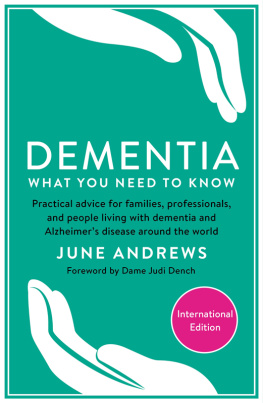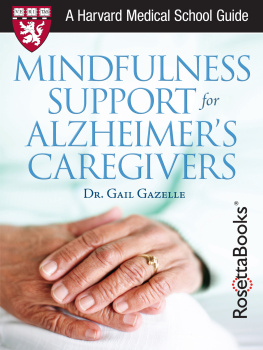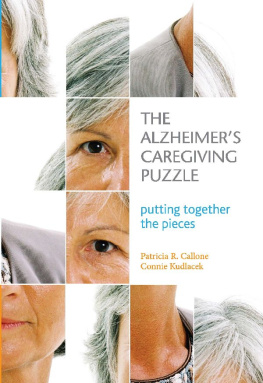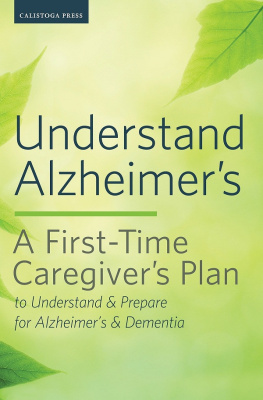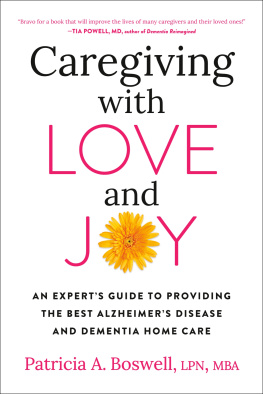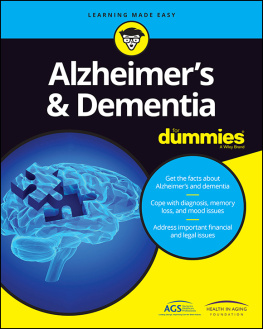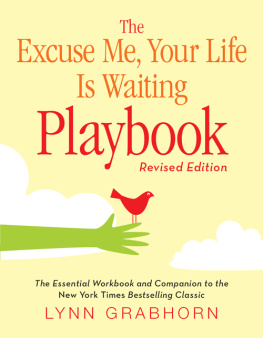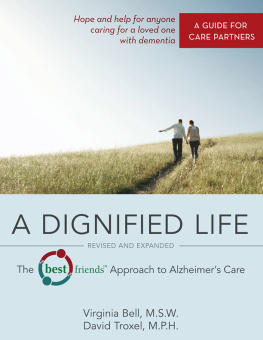First Mariner Books edition 2004
Copyright 2003 by Joanne Koenig Coste
Foreword copyright 2003 by Robert N. Butler, M.D.
ALL RIGHTS RESERVED
For information about permission to reproduce selections from this book, write to Permissions, Houghton Mifflin Harcourt Publishing Company, 215 Park Avenue South, New York, New York 10003.
www.hmhco.com
The Library of Congress has cataloged the print edition as follows:
Coste, Joanne Koenig.
Learning to speak Alzheimers : a groundbreaking approach
for everyone dealing with the disease / Joanne Koenig Coste.
p. cm.
Includes index.
ISBN 0-618-22125-5
1. Alzheimers diseasePatientsCarePopular works. 2. Alzheimers diseasePatientsRehabilitationPopular works. 3. CaregiversPopular works. I. Title.
RC 523.2. C 67 2003
362.1'96831dc21 2003051141
e ISBN 978-0-547-52682-9
v3.1214
T O T EDDIE , my beloved husband, who provided the structural and emotional space to pen these pages, along with reams of computer paper, Massenet and Mozart in the background, silence when necessary, breakfast in bed, lectures as needed, and love.
And to P AUL R AIA, a.k.a. Dr. Know, who for more than two decades has led thousands of families to more positive and productive places with his witty style, habilitative wisdom, and compassionate advice.
Acknowledgments
This book has taken a very long time to research and write. My ideas for living through the process of Alzheimers disease, and doing so with an occasional smile, have been enriched by the feelings expressed by the patients and care partners I have worked with over the past three decades. My suggestions have been validated by a multitude of professionals who daily make life kinder for this very special fellowship of memory-impaired adults and those who love them.
Ive designed the book to underscore my philosophy of living in the patients worldof reaching them through their remaining emotions, and, when words fail, listening to their eyes. I have attempted to capture the feelings of those whose verbal language is failing in my poems at the opening of each chapter. I hope this will assist the reader in comprehending the emotion and the remaining cognition behind the loss of memories.
I am deeply grateful to my children, Scott, Wendy, Kristen, and Jason, who have always been the root of my strength and dearly loved. Many thanks also to Mimi and Grampy, who said, Of course you can; to Todd, for his hugs and warm words; to Garrett, who learned to say Just a minute and Ill get her as part of his daily routine; and to my precious darlings, Shay, GG, Jamie, Ty, and Hunter, whose faces beam at me from a desktop photo and keep me centered.
From deep within my heart I thank Nancy Stone Hindlian and Linda Gibson, who have taught me a deeper and more profound meaning of the word sister. To Carrie Jochelson, Dr. Dilar Acar, Dr. Jeanne Richard, and Cheryl Weinsteinthank you for teaching me how to listen to myself. I offer this book up to heaven as wellto Helen Stone and Paul Wilson for snapshots of life reflected through loving eyes.
I joyfully acknowledge Muriel Baum, Dick Blinn, Jerry Flaherty, Paul McCarty, Walter Ohanian, Dan OLeary, Dr. Harold Schiff, Dr. Dennis Selkoe, Mike Splaine, Dr. Marrott Sinex, Marilyn Stasonis, and a myriad of other health care professionals who were there beside me in the earliest days of pioneering compassionate best-practice efforts for those with Alzheimers disease. Thanks also to Mark Ailinger and Kate Salmon, who continue to help.
For my friends Lois Pecora, Paul Raia, and Elaine Silverio, who have sat beside me as facilitators of early-stage patient groups for many years, thanks for the sharing, the laughter, the untamed joy, and the tears. You have given unconditionally and helped thousandshow lucky I have been to share this journey with you. I must thank Laura van Dam, editor extraordinaire, for believing in this book from the beginningher sense of whats right and her compassion go hand in hand; Erica Avery, who has made this process much smoother; Janet Silver, publisher and editor-in-chief, for standing so firmly behind this endeavor; Bridget Marmion, director of marketing, and Lori Glazer, executive director of publicity, whose support for this book has been gratifying and exhilarating; Suzanne Cope and Gracie Doyle, whose thoughts and energy in the marketing and publicity for this book have already been extraordinary; Peg Anderson, manuscript editor, who showed me wonderful new ways to be a writer; and all the other great people at Houghton Mifflin.
Thanks to Bill Patrick, who initially edited my words into a book that Im proud to have written. To my agent, Jeff Kleinman, of Graybill and English, I offer much gratitude for sharing many joyous accomplishments and for pushing, applauding, and being there at all hours to write with me, guide me, chastise gently, and lead me on this journey into myself. You are the greatest, Jeff.
Above all, this book would not have been possible without countless patients and the care partners who have helped them. I am grateful to everyone who shared anecdotes, joys, fears, tears, and laughter with me. Each person is a part of my memory bank, and each has made my heart fuller. Thank you.
Foreword
Alzheimers disease is one of the great scourges of old age in the twenty-first century. Devastating, irreversible, and progressive, it robs millions of older Americans of their use of language, reasoning, memory, and judgment. Alzheimers destroys a lifetime of memories and whittles away at the core of a persons identity. It irrevocably alters the lives of families who have a member with Alzheimers, often necessitating a painful redefinition of the primary relationship between parents and children, between husband and wife. Alzheimers disease exacts an enormous emotional, physical, and psychological toll upon caregiving family members.
The third most costly disease after heart disease and cancer, Alzheimers places an enormous burden on the U.S. health care system. Experts estimate that the dollar cost to the nation of caring for people with Alzheimers was more than $100 billion in 2002, with neither Medicare nor most private health insurance providers covering the long-term care that most patients eventually need. The cost to American businesses in 2000 was more than $61 billion, with the costs of absenteeism, productivity loss, and employee replacement as a result of family caregiving consuming $36.5 billion.
In 2002, 45 percent of the National Institute on Aging (NIA) research budget was earmarked for research on Alzheimers disease. That percentage represents a major advance over the funding level in 1975, when I became the founding director of the NIA and identified the study of Alzheimers and other dementias as a key priority. From 1955 to 1962 I had worked at the National Institute of Mental Health, studying healthy aging and dementias full-time, and I continued to do so part-time thereafter. When I began to prioritize the research agenda at the NIA, my clinical and scientific interest in dementia contributed to the decision to promote research in Alzheimers.
Up to that time senility was the popular term used to describe all the dementias. Patients, doctors, and scientists alike viewed a diagnosis of dementia with a sense of hopelessness. Their pessimism stemmed from the false belief that senilitythe dementiaswas an inevitable result of aging. Dementias were often presumed to be the result of cerebral arteriosclerosis (colloquially known as hardening of the arteries); researchers didnt recognize preventive measures for that condition until the 1970s. In that era, doctors assumed that Alzheimers disease was a rare form of senility that began before age sixty.
The image of the senile man or woman, the traditional stereotype of old age in Western society, was translated into hesitancy on the part of social and scientific policymakers to invest in research into the basic biology of aging. The rationale was that money spent on aging research was money wasted on the decrepit and incompetent.
Next page
